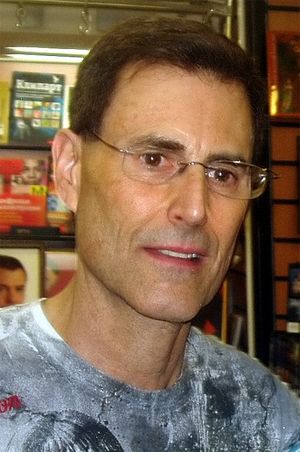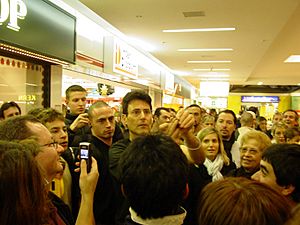Uri Geller facts for kids
Quick facts for kids
Uri Geller
|
|
|---|---|

Geller in 2009
|
|
| Born | 20 December 1946 |
| Occupation | Performer, illusionist, self-proclaimed psychic |
| Years active | 1968−present |
| Spouse(s) |
Hannah Geller
(m. 1979) |
| Children | 2 |
Uri Geller (born 20 December 1946) is a famous Israeli-British illusionist, a type of magician, and a TV star. He says he has special psychic powers. Geller is most famous for his TV shows where he appears to bend spoons and other metal objects using only his mind. He also claims to use his mind for things like finding hidden objects or reading thoughts.
Many people, especially other magicians, say that Geller uses clever magic tricks to make it look like he has psychic powers. His career as an entertainer has lasted over 40 years, with many TV shows and appearances around the world.
Contents
Uri Geller's Early Life
Uri Geller was born in Tel Aviv on December 20, 1946. At that time, Tel Aviv was part of British Mandate of Palestine, which is now Israel. His parents came from Jewish families in Austria and Hungary.
When he was 11, Geller's family moved to Nicosia, Cyprus. There, he went to high school and learned English. At 18, he joined the Israeli Army. He was a paratrooper and was hurt during the 1967 Six-Day War. After the army, he worked as a model. In 1968, he started performing magic tricks in nightclubs. He quickly became well known in Israel.
A scientist named Andrija Puharich, who studied unusual mental abilities, met Geller in 1971. Puharich helped Geller travel to the United States to show his skills.
Uri Geller's TV Career
Geller became very famous by showing what he said were psychic powers on TV. These included bending spoons, guessing hidden drawings, and making watches stop or speed up. Geller said he did these things with his mind and strong willpower. His ability to bend metal objects on TV became known as the "Geller effect."
A famous magician and investigator named James Randi believed Geller used magic tricks. Randi helped show how Geller's feats could be done with normal stage magic.
In 1973, Geller appeared on The Tonight Show Starring Johnny Carson. Johnny Carson, who was also a magician, was doubtful of Geller's powers. Before the show, Carson's team prepared their own props and did not let Geller touch them. When Geller came on stage, he seemed surprised. He said he didn't feel strong enough to perform and felt pressured. He was unable to show any psychic abilities.
Even though he didn't perform well on Carson's show, Geller became even more famous. People thought that if he were just doing magic tricks, they would work every time. So, his failure made his powers seem more real to many.
Geller also appeared in a horror movie called Sanitarium in 2001. In 2002, he was a contestant on the reality TV show I'm a Celebrity...Get Me Out of Here! in the UK. He was the first person voted off.
In 2007, Geller hosted a TV show in Israel called The Successor. On this show, contestants supposedly showed supernatural powers. Magicians in Israel said the show was just using magic tricks. Geller said he liked the "mystical aura" that the show gave him. He hosted similar shows in Germany and Hungary.
In 2008, on the German TV show The Next Uri Geller, Geller said he did not have any supernatural powers. He then winked at the camera.
A 2013 BBC documentary claimed Geller worked as a "psychic spy" for the CIA and Mossad. In the film, Geller said he once erased computer disks carried by KGB agents just by chanting "erase."
Claims of Psychic Powers
Geller has often said that his abilities come from aliens. However, groups like the Committee for the Scientific Investigation of Claims of the Paranormal (CSICOP) were early critics. Skeptics like James Randi have shown that Geller's tricks can be copied using normal stage magic techniques.
In 1971, Andrija Puharich said Geller was a real psychic. Puharich even claimed that Geller once teleported a dog through a wall. Science writer Martin Gardner said that since no expert on magic tricks was watching, no one should believe this claim.
In 1992, Geller was asked to help find a missing model in Hungary. He predicted she would be found safe, but she was never found.
Geller also got involved with football clubs. In 1997, he placed "energy-infused" crystals behind the goals for the Exeter City team to help them win. Exeter lost the game 5–1. He was later a co-chairman of the club, but they were relegated to a lower league. He also claimed to help Reading F.C. avoid relegation by telling fans to say "win, Reading, win." The team's manager said Geller had nothing to do with their success.
In 2008, Geller told a magazine that he no longer says he does "supernatural" things. He said, "I say 'I'm a mystifier!'" He added that this doesn't mean he doesn't have powers, just that he doesn't call them supernatural.
In 2019, Geller wrote a letter to the British Prime Minister, Theresa May. He said he would use his mind to stop her from leading Britain out of the European Union. However, the UK did leave the European Union later under a different leader.
How Magicians Do It
Many scientists and magicians have explained how Geller's tricks, like bending spoons, can be done without psychic powers. Magicians use misdirection to distract the audience. For example, a magician can quickly bend a spoon when no one is looking directly at it. Then, they slowly show the bend, making it seem like the spoon is bending by itself. Another trick is to slightly bend the spoon beforehand, so it takes less effort to bend it completely during the show.
James Randi, a big critic of Geller, wrote a book called The Truth About Uri Geller. In it, he explained how all of Geller's supposed psychic abilities, like spoon bending and moving objects with his mind, can be easily done with sleight of hand (clever hand movements).
In his early autobiography, My Story, Geller admitted that his manager once convinced him to add a magic trick to his shows. This trick made it look like Geller could guess car license plate numbers from the audience. But his manager had actually given him the numbers beforehand.
Geller himself has said, "Sure, there are magicians who can duplicate [my performances] through trickery." But he still claims that he uses real psychic powers to get his results.
In 2008, Geller accepted an award from a group of magicians. In his speech, he said that if he didn't have psychic powers, then he "must be the greatest" for fooling so many people, including scientists and journalists.
Scientific Tests
Geller's performances often happened in casual settings, like TV interviews. But early in his career, he let some scientists study his claims.
In 1973, the US Central Intelligence Agency (CIA) tested Geller. The scientists said that Geller "demonstrated his paranormal perceptual ability in a convincing and unambiguous manner."
Another study was done in 1973 at the Stanford Research Institute (SRI). Scientists Harold E. Puthoff and Russell Targ tested Geller. They put Geller in a separate room and asked him to copy simple drawings. They wrote in a science journal that he did well enough to need more serious study.
However, critics like James Randi and psychologist Ray Hyman said that the SRI experiments were not done carefully enough. They pointed out that the scientists, Puthoff and Targ, already believed in psychic powers. Also, Geller was not properly checked for hidden items before the tests.
Psychologists David Marks and Richard Kammann also criticized the SRI tests. They found that Geller might have cheated. They said Geller could have peeked through a small hole in the wall to see the drawings. He also had an intercom, which let him hear the scientists talking about the drawings. Marks concluded that Geller had "no psychic ability whatsoever" and was just a "very clever, well-practiced magician."
Marks and Kammann also tested Geller's ability to fix watches with his mind. They found that many "broken" watches were just stopped by thick oil. Holding them in his hand would warm the oil, making the watches start ticking again.
Copyright Issues
In 2000, Geller sued the video game company Nintendo for £60 million. He claimed that the Pokémon character "Kadabra" (called "Yungerer" in Japan) was based on him without permission. The Pokémon has psychic powers and carries a spoon. Geller also said that symbols on Kadabra were like those used by the Nazis, which was not true. The Japanese name for Kadabra sounds like Geller's name. Geller said, "Nintendo turned me into an evil, occult Pokémon character." Because of this, Kadabra was not used on Pokémon trading cards for many years. In 2020, Geller apologized and allowed cards with Kadabra to be printed again.
In 2007, Geller tried to remove a video from YouTube that showed him failing to perform. The video was from a TV show called "Secrets of the Psychics." The person who uploaded the video, Brian Sapient, fought back. They eventually settled the case out of court.
Uri Geller's Personal Life
Uri Geller married Hanna Geller in 1979. Michael Jackson was the best man when they renewed their wedding vows in 2001. Geller also helped arrange a TV interview between Michael Jackson and a journalist.
In 2009, Geller bought a small, uninhabited island off Scotland called Lamb Island. The island was known for old stories about witches. Geller claims that ancient Egyptian treasure is buried there, brought by a mythical princess named Scota. He believes he can find the treasure using dowsing. He also said he made the island's mystical powers stronger by burying a crystal ball that once belonged to Albert Einstein there. In 2022, Geller tried to declare Lamb Island its own small country.
In 2014, a 12-foot-tall statue of a gorilla made from about 40,000 metal spoons was put in Geller's garden in England. Many of the spoons were donated by schoolchildren. Geller said the statue would "amaze sick children."
Since 2015, Geller has lived in Tel Aviv, Israel. Before that, he lived in England. He speaks three languages: Hebrew, Hungarian, and English. He has written 16 books.
Geller is the president of a group that supports Magen David Adom, which is like the Red Cross in Israel.
In 2021, Geller opened the Uri Geller Museum in Old Jaffa, Tel Aviv. The museum shows his personal collection of art and objects from his career. It also has an old soap factory that was found during the museum's renovation.
See also
 In Spanish: Uri Geller para niños
In Spanish: Uri Geller para niños
 | DeHart Hubbard |
 | Wilma Rudolph |
 | Jesse Owens |
 | Jackie Joyner-Kersee |
 | Major Taylor |


